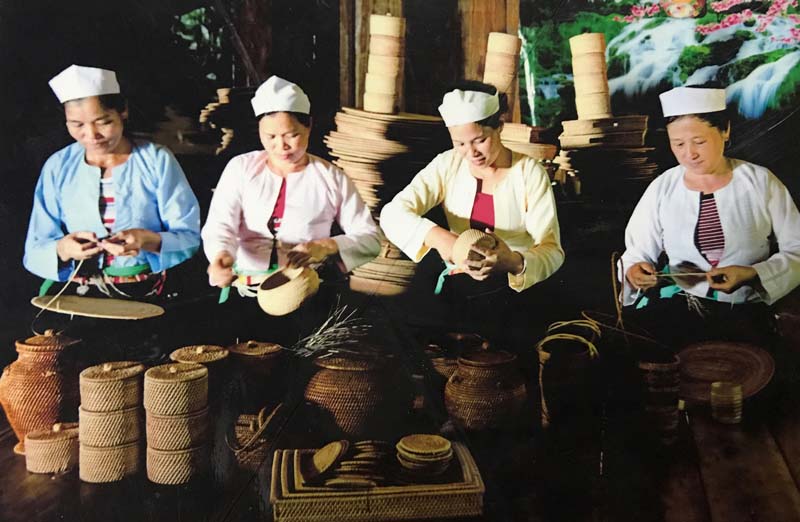
(HBO)- The rattan and bamboo craft in Lac Son district has existed for a long time. The sophisticated and unique features on each product are always cherished and preserved. Determining the importance of the traditional rattan and bamboo craft for the economic development and preservation of the national cultural identity, Lac Son district is gradually supporting, restoring and building traditional villages to take the part in the hunger eradication and poverty alleviation, improving income and creating jobs for the rural laborers.

The rattan and bamboo craft cooperative in
Bui village, Nhan Nghia commune (Lac Son) regularly provide jobs for 70
laborers and 300 seasonal workers.
The rattan and bamboo craft in Nhan Nghia
commune has been lasted for a long time. In the past, people used to weave
baskets, flower baskets, betel nuts and so on to serve the family activities
and small businesses. From 2000 up to now, this profession has grown in both
the scale and value. The products have diversified designs with high quality
and they are ordered by customers everywhere. The craft villages were
officially recognized in December 17, 2017, the rattan and bamboo craft
co-operative of Bui village, Nhan Nghia commune has created stable jobs for 70
members and over 300 local seasonal workers with the income of 2.5 - 3 million
VND per person a month. The cooperative has been effectively operated. The
products have diversified models with high quality and they are mainly made by
hand, so they are favored in the market. The cooperative has received a lot of
orders from provinces, cities and foreign countries like China and Japan.
Ms. Quach Thi Dung, the chairman of the
rattan and bamboo craft co-operative of Bui village, Nhan Nghia commune said:
"Because of the passion and the sense of preserving the national cultural
identity, many artists and I have the determination to develop the profession
and find the ways to restore it. The grandmothers and mothers all make efforts
to propagate to the young generation about the sense of preserving the
traditional culture of the nation, handing the precious experiences in the
profession, the hidden essence in each product. Thanks to the perseverance and
the effort of the workers, receiving the support and help of the authorities at
all levels at the same time, the rattan and bamboo craft has a foothold, and it
is popular in the market ".
Currently, in addition to the rattan bamboo
craft cooperative of Nhan Nghia commune, Vu Lam, Van Nghia, Van Son and Yen Phu
communes have also set up the concentrated production facilities.
More than just an information technology teacher, Bui Van Nien is an inspiring figure who has nurtured the scientific curiosity and creative spirit of students in Vietnam’s ethnic minority communities.
Da Bac is the most disadvantaged mountainous district in Hoa Binh province, with ethnic minorities accounting for about 90% of its population. Over the past years, the district has mobilised resources to implement ethnic policies to improve the quality of life of local people.
In recent years, Hoa Binh province has consistently prioritised the protection, care, and education of children, particularly those from ethnic minorities and disadvantaged backgrounds, by creating a safe, healthy, and nurturing environment for their all-round development.
The Steering Committee for Tobacco Harm Prevention and Control of Hoa Binh province, in coordination with the Tobacco Harm Prevention and Control Fund, held a ceremony on May 28 in response to the World No Tobacco Day (May 31) and the National No Tobacco Week (from May 25 to 31). The event was chaired by Nguyen Van Toan, Standing Vice Chairman of the provincial People’s Committee and head of the Steering Committee.
Since 2021, the Center for Industrial Promotion and Industrial Development Consulting (CIIDC) under the Department of Industry and Trade has been implementing a school lighting model as part of the plan for using energy efficiently and economically in Hoa Binh Province in the pẻiod of 2021 - 2025. This model not only aims to improve the learning conditions and enhance the education quality, but it also promotes the message of energy saving, energy security, environmental protection and contributes to the goals of socio-economic development.
In the 2024 - 2025 school year, the entire Hoa Binh provincial education sector includes 520 educational institutions and schools. Among them are 13 ethnic boarding schools with 153 classes and 4,487 students. Four of these schools have met national standards, reaching 30.7 percent.



